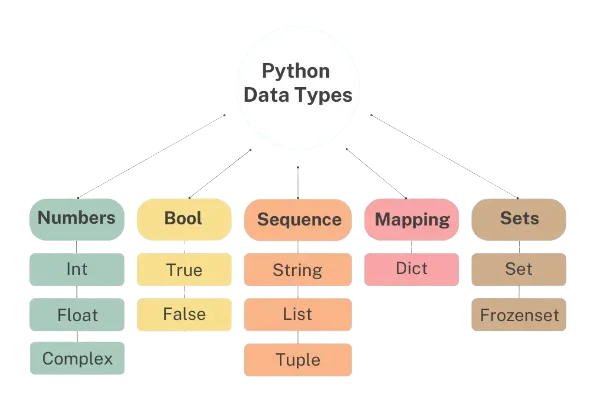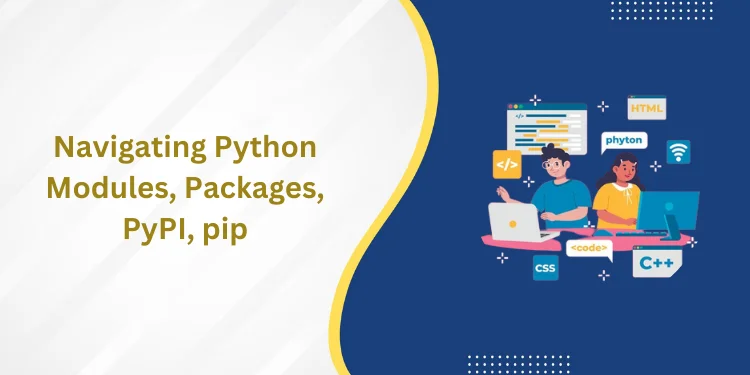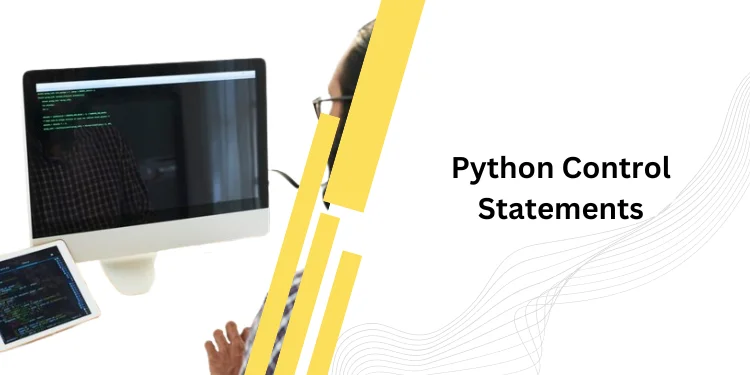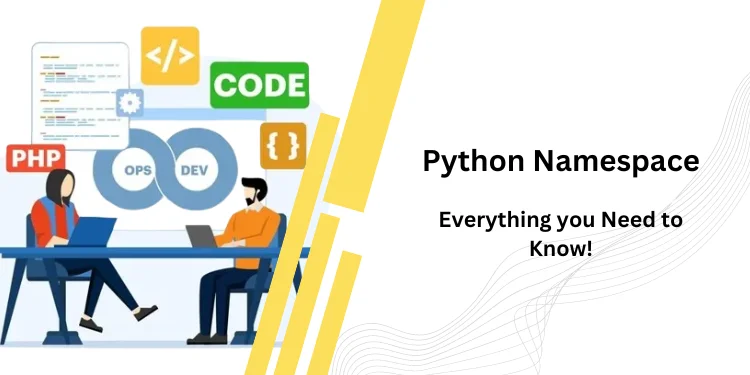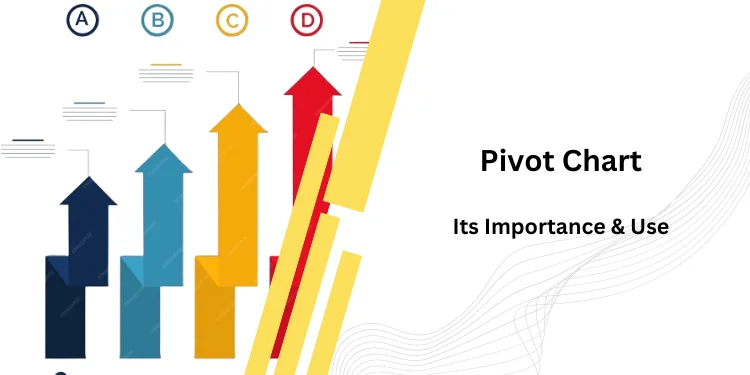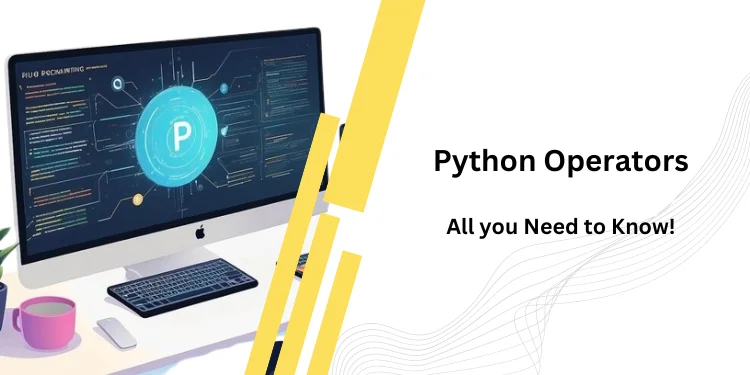Table of Contents
ToggleIntroduction
Can AI in Healthcare revolutionize healthcare? The answer is a resounding yes. Healthcare delivery has undergone significant changes with enviable impact driven by Artificial Intelligence(AI) in recent years. In this article, we appreciate how AI in Healthcare advancements has seen vast improvements from diagnosis to perfecting treatment while streamlining admin functions like never before thanks to AI usage integration with hospital setups.
We are in awe of the potential for further development because of the dramatic changes that it has already wrought and the promises it has made for a significantly improved and brighter healthcare delivery system. This review examines the numerous uses, advantages, and potential future developments as AI impacts the healthcare industry. Take part in our exploration of this brand-new healthcare frontier right here! Welcome to the world of AI in healthcare.
What Is the Role of AI in the Healthcare Industry
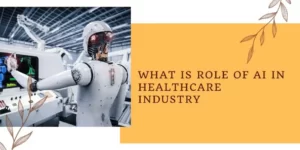
AI in healthcare pertains to the implementation of artificial intelligence technologies within the field of medicine for improved healthcare outcomes. Utilizing cutting-edge algorithms, machine learning, and data analytics, entails the analysis and interpretation of medical data in order to aid in diagnosis, forecast results, improve treatment options, and enhance overall healthcare delivery.
The use of AI in healthcare spans a variety of areas, including clinical decision support systems, virtual assistants, drug development, patient monitoring, and customized medicine.
Healthcare professionals are able to improve patient outcomes, expedite administrative chores, and alter the way healthcare is provided by utilizing AI.
Applications of AI in the Healthcare Industry
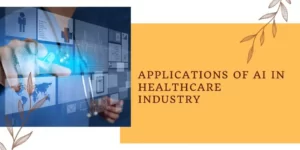
AI has numerous applications in healthcare that have the potential to revolutionize the industry. Some key applications of AI in healthcare include:
Medical Image Analysis
The field of medical image analysis has witnessed significant advances thanks to AI algorithms. Such computer-based systems can analyze various types of medical images, such as X-rays CT scans, and MRIs. Through this process of analysis, AI algorithms can assist healthcare professionals in diagnosing diseases and detecting abnormalities while also providing quantitative measurements.
Clinical Decision Support
Another area where AI has exhibited its potential is in the domain of clinical decision support. These AI-powered systems can enhance the quality of healthcare services by delivering real-time evidence-based support to doctors. This assistance takes place by analyzing patient data and medical literature along with treatment guidelines. By aiding clinical decision making these systems help professionals formulate more accurate diagnoses and treatment plans.
Drug Discovery and Development
Moreover, AI can expedite the drug discovery procedure by analyzing huge amounts of data that would be difficult for humans to access comprehensively. Using machine learning models that identify patterns in data sets helps researchers predict the effectiveness of potential drug candidates swiftly and precisely. Thus it leads to faster and more focused drug development.
Predictive Analytics
Another way that AI in Healthcare industry is transforming healthcare is through predictive analytics that offers patient-specific insights based on clinical evidence from similar cases accessible from an oceanic-level database available globally within seconds. With such insights, clinicians can predict disease progression trends in individual patients over time accurately.
Remote Monitoring and Wearable Devices
Remote patient monitoring using wearable devices provides an avenue for delivering better care irrespective of geographic constraints helping patients receive timely interventions courtesy of real-time insights generated by algorithmic analysis fed into cloud-based platforms for timely retrievals for remote marking captured during periodic check-ins with physicians just a plethora few possibilities among many afforded by modern assistive technologies leveraging artificial intelligence skillsets in today’s world!
Check out our Best Data Science Program
Benefits of AI in the Healthcare Industry
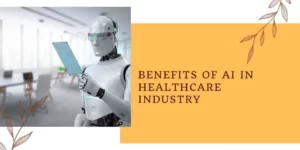
AI offers several benefits in the field of healthcare, revolutionizing the way medical services are delivered. Some key benefits of AI in Healthcare include:
Improved Diagnostic Accuracy
AI algorithms can analyze complex medical data, such as medical images and patient records, with a high level of accuracy, helping healthcare professionals make more precise and timely diagnoses.
Enhanced Treatment Planning
AI can assist in creating personalized treatment plans by analyzing patient data, medical literature, and treatment guidelines, resulting in more targeted and effective interventions.
Increased Efficiency and Productivity
AI can automate routine administrative tasks, data entry, and documentation, freeing up healthcare professionals’ time to focus on patient care and complex decision-making.
Real-time Clinical Decision Support
AI-powered systems provide real-time insights and evidence-based recommendations, helping healthcare professionals make informed decisions and reduce medical errors.
Predictive Analytics and Early Intervention
AI algorithms can analyze patient data to identify patterns, detect early signs of diseases, and predict disease progression, enabling proactive interventions and better patient outcomes.
Remote Monitoring and Telemedicine
AI facilitates remote patient monitoring through wearable devices and telemedicine platforms, enabling continuous monitoring of vital signs, remote consultations, and virtual care delivery.
Accelerated Drug Discovery
Revolutionizing industry standards globally; the integration of AI has catapulted drug discovery processes forward immeasurably via extensive analysis of complex biomedical data models whilst creating predictive efficacy measurements for new drugs based solely upon empirical findings gleaned from said data sets thus enhancing successful results whilst also culling futile projections quickly & decisively without wasting additional resources on failed candidates.
Improved Patient Experience
Also moving towards enhancing overall patient experience; innovation within this burgeoning area has birthed such features as personalized virtual assistant service via chatbot-based technologies which operate nonstop catering dedicatedly towards all com
monly known medical query genres leading towards formidable boosts in customer experience satisfaction & retention rates across the industry as a whole!
Check out our Data Science Course in Delhi
Some Examples of AI Tools used in the Healthcare Industry
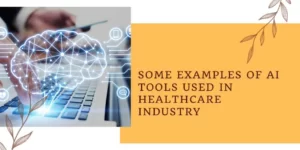
Here are some examples of AI tools used in healthcare Industries:
Electronic Health Records (EHR)
AI-powered EHR systems assist healthcare professionals in managing and accessing patient records, including medical history, medications, allergies, and test results. These systems can automate data entry, analyze data for patterns and insights, and facilitate decision-making.
Clinical Decision Support Systems (CDSS)
CDSS leverages AI algorithms to provide healthcare professionals with evidence-based recommendations and alerts during the diagnostic and treatment process. These systems can assist in identifying potential drug interactions, suggesting treatment plans, and improving patient safety.
Virtual Nursing Assistants
AI-powered virtual nursing assistants provide personalized patient care, answer common health questions, and offer reminders for medication and appointments. These virtual assistants can be integrated into mobile apps or voice-enabled devices and help patients manage their healthcare at home.
IBM Watson Health (Merative)
AI platform that leverages natural language processing and machine learning to assist in clinical decision-making, research, and data analysis. IBM Watson Health (Merative) is committed to helping build smarter health ecosystems. This means working with you to help you achieve simpler processes, better care insights, faster breakthroughs, and improved experiences for people around the world.
Virtual Assistants and Chatbots
AI-enabled virtual assistants or chatbots are gaining traction in personalized patient support as they allow one-to-one interactions with patients around the clock through digital channels chat rooms or email mode communication while providing essential health advice regarding medication or disease information anytime anywhere around the clock.
Future Possibilities of AI in Healthcare
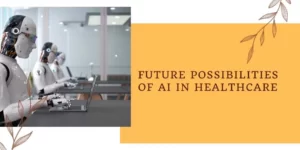
The healthcare industry stands poised for significant breakthroughs propelled by advances in artificial intelligence (AI) technology that will improve patient care services significantly.
Precision Medicine
Precision Medicine has the potential to revolutionize healthcare as we know it and AI is an indispensable tool in this quest. By analyzing vast amounts of patient data, genomic information, and treatment outcomes, AI in Healthcare can develop personalized treatment plans tailored to individual patients. This approach not only ensures better outcomes for patients but also reduces healthcare costs by making treatments more efficient.
Drug Discovery and Development
Drug Discovery and Development can benefit greatly from the adoption of AI in healthcare technology. By analyzing massive datasets identifying patterns and predicting the effectiveness of potential drug candidates AI can significantly accelerate the drug discovery process. This could lead to faster development of new drugs and more efficient clinical trials.
Remote Patient Monitoring
Remote Patient Monitoring is changing the face of healthcare by enabling healthcare professionals to detect early warning signs provide timely interventions and improve patient outcomes. With AI-powered devices and sensors that enable remote monitoring of patients’ health conditions over long periods of time.
Remote Patient Monitoring
Particularly for individuals with chronic conditions remote patient monitoring can be life-saving. Predictive Analytics for Disease Prevention involves leveraging algorithms that analyze patient data to identify patterns that help predict the risk of developing particular diseases. Implementing these findings enables proactive interventions as well as preventive measures such as lifestyle recommendations meant to minimize occurrence or severity.
Surgical Robotics & Assistance
Surgical Robotics & Assistance is transforming surgical procedures into complex procedures with greater precision using AI-powered robotic systems. These advances lead to minimally invasive surgeries resulting in reduced recovery times & improved patient safety enhancing the power of AI in Healthcare.
Virtual Health Assistants
Virtual Health Assistants powered by artificial intelligence constitute an engaging care option providing personalized recommendations such as medical advice on demand or answering basic queries allowing accessible information while additionally reducing work time for health professionals – a win-win situation!
Mental Health Support
AI algorithms can analyze speech patterns, facial expressions, and other indicators to assess mental health conditions and provide support and guidance to individuals in need. This can improve access to mental healthcare and enable early intervention.
Health Data Analytics
AI can analyze vast amounts of health data, including electronic health records, medical images, and research papers, to derive valuable insights and drive evidence-based decision-making in healthcare.
Robotics-Assisted Surgery
AI and robotics technologies are combined to enhance surgical procedures. Robots can assist surgeons by providing precise movements, reducing the risk of human error, and enhancing minimally invasive techniques.
Natural Language Processing (NLP)
NLP techniques are used to extract information from medical records, clinical notes, and scientific literature. AI-powered NLP tools can process unstructured data, such as free-text clinical notes, to identify relevant information and support clinical decision-making.
Check out The Best Data Science Program in India
Conclusion
In summing up, Artificial Intelligence has sparked a revolution within the medical field by introducing innovative ways of delivering quality healthcare services to patients worldwide. Improving accurate diagnoses and treatment planning with increased efficiency are only some aspects of boosting patient outcomes possible through this intelligent tool.
AI efficiently provides real-time clinical decision support systems combined with futuristic predictive analytics and remote monitoring, leading to timely personalized c
are solutions.
Thus enabling leveraging innovations like virtual assistants or chatbots will lead to further progress that will enhance user experience leveraging newer tools aimed at powering research leading towards quicker drug discoveries or disease treatments on a broader level. So we could conclude that AI in Healthcare can revolutionize the medical industry.
Frequently Asked Questions
What is AI in healthcare?
Healthcare providers utilize artificial intelligence technologies, collectively known as AI in healthcare to enhance patient care and outcome.
How is AI used in medical imaging?
Medical imaging leverages the power of artificial intelligence to aid in analyzing and interpreting various types of images including X-rays and MRIs.
Can AI in healthcare improve patient outcomes in healthcare?
AI holds promise for enhancing patient outcomes through expediting and enhancing diagnoses, tailored treatment strategies, and predictive analytics. So yes AI in healthcare can improve patient outcomes in medical care.
Are there ethical concerns with AI in healthcare?
Yes, there are ethical concerns such as privacy, data security, and the need for transparency and fairness in AI in Healthcare algorithms.





